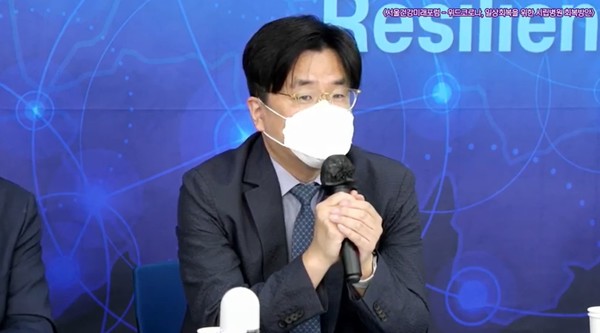Covid-19 is entering a new phase, but reflections on the existing quarantine system and discussions about future responses are lacking in Korea amid the change of political power, an expert said Wednesday.
“Now is the time for the government to consider responses to the future pandemic,” said Lee Jae-gap, an infectious disease professor at the Hallym University Gangnam Sacred Heart Hospital, at a workshop. “However, such discussions have gone below the surface amid the change of political power.”

The Covid-19 wave seems to have peaked out, but some experts predict the pandemic, or endemic, would continue over the next couple of years, he noted.
“The quarantine authorities should be evaluating whether they made the right choices amid the Omicron wave and rack their brains to develop future responses,” Profess Lee said. The infectious disease expert has recently said the government’s mistaken quarantine response amid the global Omicron wave accelerated its spread beyond the “uncontrollable level,” increasing the damage.
The Covid-19 death toll had remained at 6,873 until Feb. 6.
However, the cumulative number of deaths has reached 23,491 recently, more than three times higher than the pre-Omicron days, according to the Korea Disease Control and Prevention Agency (KDCA). Lee pointed out that 40 percent of recent Covid-19 deaths occurred at care hospitals and nursing homes.
“The current situation shows the same problems keep occurring at vulnerable facilities. If we fail to solve problems at convalescent hospitals and sanatoriums, these will remain places where people continue to die. How we prepare in the next couple of months and years will determine how effectively Korea will cope with the next pandemic or variables,” the professor said.
Lee noted that amid the worst pandemic, the public seems to have learned how to live with the virus but doubted whether the government has also done so. The next few years will be when the Covid-19’s spread will undergo the most significant change. At stake is how the central and local governments would deal with it.
“If the new government continues to operate the system of its predecessor, the nation can’t help but repeat the pattern where nursing hospitals and other similar facilities will suffer, and damages increase whenever another pandemic wave hits the nation,” Lee said. “That explains why the government should come up with extraordinary measures.”
More specifically, Lee suggested that the government streamlines the entire infectious disease response system and presents a mid- to long-term road map. He also stressed the need to expand the role of a new agency proposed by President Yoon Suk-yeol, exclusively responsible for predicting and analyzing infectious diseases.
“The downgrading of Covid-19 from the first and second grade does not mean the pandemic’s risk has declined but shows the government’s intention to cope with it,” Lee said. “That emphasizes revising the social and medical system befitting the change. Most typical of these problems is how to modify insurance payment and loss compensation systems.”
He explained that the government’s loss compensation system shifts to insurance reimbursement during the transition period. To help neighborhood clinics create a safe face-to-face treatment environment and large hospitals build a structure to deal with respiratory diseases more effectively, Lee pointed out that the government will need enormous money and considerable time.
“The government should activate a committee that operates according to a long-term road map to establish a better infectious disease response system,” Lee said. “The group of infectious disease experts under the direct jurisdiction of the president as proposed by the new government should do more than simply predict and analyze the situation but come up with ideas to improve hospital structure, readjust reimbursement structure, and create financial resources that cannot be done by insurance.”

